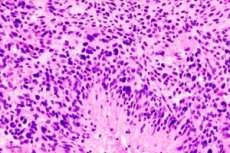New publications
New mRNA-based cancer vaccine triggers a strong immune response against malignant brain tumor
Last reviewed: 02.07.2025

All iLive content is medically reviewed or fact checked to ensure as much factual accuracy as possible.
We have strict sourcing guidelines and only link to reputable media sites, academic research institutions and, whenever possible, medically peer reviewed studies. Note that the numbers in parentheses ([1], [2], etc.) are clickable links to these studies.
If you feel that any of our content is inaccurate, out-of-date, or otherwise questionable, please select it and press Ctrl + Enter.

For the first time, University of Florida researchers have conducted a human clinical trial, showing that their mRNA cancer vaccine quickly reprograms the immune system to attack glioblastoma, the most aggressive and deadly type of brain tumor.
The results of the trial in four adult patients confirm similar results obtained in 10 pet dogs with naturally occurring brain tumours, whose owners consented to their participation because there were no other treatment options. The breakthrough will now be tested in a Phase I clinical trial in children with brain cancer.
Published in the journal Cell, the findings represent a potential new way to harness the immune system to fight hard-to-treat cancers using a modified mRNA technology and lipid nanoparticles similar to the COVID-19 vaccines, but with two key differences: using a patient's own tumor cells to create a personalized vaccine, and a new, sophisticated delivery mechanism inside the vaccine.
"Instead of injecting single particles, we inject clusters of particles that wrap around each other like a bag of onions," said senior author Elias Sayur, MD, PhD, a UF Health pediatric oncologist who developed the new vaccine. Like other immunotherapies, the vaccine "trains" the immune system to recognize the tumor as a foreign object.
"Among the most impressive findings was how quickly the new method, administered intravenously, elicited a powerful immune response to reject the tumor," Sayur said.
"In less than 48 hours, we could see these tumors go from a 'cold' state (with very little immune cell activity) to a 'hot' state (with a very active immune response)."
Glioblastoma is one of the most devastating diagnoses with a median survival of about 15 months. Standard treatment includes surgery, radiation therapy and a combination of chemotherapy.
The new publication is the result of seven years of research, beginning with preclinical mouse models and then a clinical trial in 10 pet dogs with terminal brain cancer, conducted with owner consent in collaboration with the UF College of Veterinary Medicine.
After treating pet dogs with personalized mRNA vaccines, Sayur's team moved on to a small-scale, FDA-approved clinical trial to ensure safety and test feasibility before expanding to a larger trial.
In a cohort of four patients, genetic material called RNA was extracted from each patient’s removed tumor, and the mRNA was then amplified and packaged into high-tech biocompatible lipid nanoparticles to make the tumor cells “look” like a dangerous virus when reintroduced into the bloodstream and trigger an immune response. The vaccine was personalized for each patient to make the most of their unique immune system.
"Demonstrating that creating an mRNA cancer vaccine in this way elicits similar and robust responses in mice, pet dogs with naturally occurring cancer, and human patients with brain cancer is a really important discovery," said Duane Mitchell, MD, PhD, director of the UF Clinical and Translational Research Institute and the UF Brain Tumor Immunotherapy Program and co-author of the paper.
Although it is too early to assess the clinical effects of the vaccine, patients either lived disease-free longer than expected or lived longer than expected.
The 10 pet dogs survived a median of 139 days, compared to a typical median survival of 30-60 days for dogs with this condition.
The next step, with support from the FDA and the CureSearch for Children's Cancer Foundation, will be an expanded Phase I clinical trial involving up to 24 adults and children to confirm the results.
Once the optimal and safe dose is confirmed, about 25 children will participate in Phase II.
"I hope this can become a new paradigm for treating patients, a new platform for modulating the immune system," Sayur said.
Sayur and Mitchell hold patents related to the vaccine that are in the process of being licensed by iOncologi Inc., a biotechnology company formed at UF.
